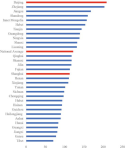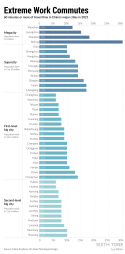You are using an out of date browser. It may not display this or other websites correctly.
You should upgrade or use an alternative browser.
You should upgrade or use an alternative browser.
Chinese Economics Thread
- Thread starter Norfolk
- Start date
This is an exceptionally severe super typhoon, and the government has ordered work stoppages and transport suspensions in certain areas.According to the typhoon bulletin issued by the Central Meteorological Observatory at 20:12 on September 21, Typhoon Ragasa, the 18th typhoon of the year, has reached maximum sustained winds of 62 meters per second near its center, equivalent to Category 17 or above. Guangdong provinces are on high alert to respond to the typhoon, with multiple regions issuing emergency notices indicating potential work stoppages and school closures this week.
Every other goddamn city in its path: work stoppageThis is an exceptionally severe super typhoon, and the government has ordered work stoppages and transport suspensions in certain areas.
Guangzhou: please be careful
Shenzhen: consider wearing sandals
Exports are at record highs this year, on track for a $1.2 trillion surplus. This is notably in spite of a sharp decline in US-bound exports.
“Protectionism from the US and other countries has turned into a paper tiger because Chinese exporters are extremely competitive,” said Arthur Kroeber, head of research at Gavekal Dragonomics. They “can absorb some of the tariff hit and also have plenty of workarounds through transshipment and relocating late-stage production to lower-tariff countries.”
“China has performed better than expected in the first half,” JPMorgan Chase & Co.’s chief India economist Sajjid Chinoy told Bloomberg Television. “Some of this is the fact that China has very cleverly found other export markets, including Europe, which has been a key hedge to slowing exports to the US.”
China’s in a better position than many other countries to find alternative markets to the US, according to Adam Wolfe of Absolute Strategy Research. Its analysis shows there’s almost a 50% overlap between what China sold to the US and what it exports to BRICS nations, suggesting much of what America no longer buys can be shipped to other markets. “China’s shown this ability to move into other markets and get market share abroad and that probably continues,” said Wolfe. “I don’t know that China is going to see a contraction in exports over the rest of the year.”
And this was in 2021 as well.
Yeah, no. Beijing was a mistake. Whoever decided that 50 villages, converted into various imitations of lower density Soviet-DPRK urban hellscape, with very little in the way of urban nodes or local centrality--
could ever even think of becoming a *city* should burn their existence away in an eternal traffic jam,
while choking on car fumes and AQI >150 + PM 2.5,
while on fire
LA with chinese characteristics headahh smh
Last edited:
And this was in 2021 as well.
Yeah, no. Beijing was a mistake. Whoever decided that 50 villages, converted into various imitations of lower density Soviet-DPRK urban hellscape, with very little in the way of urban nodes or local centrality--
could ever even think of becoming a *city* should burn their existence away in an eternal traffic jam,
while choking on car fumes and AQI >150 + PM 2.5,
while on fire
LA with chinese characteristics headahh smh
Beijing was a mistake ever since 1421. Rare Yongle L.
FriedRiceNSpice
Major
A lot of other large cities with ring roads have reasonable commutes, ie Hefei. Beijing is an outlier. Still far better than New York, where the number would be around 70-80%. In fact, a 60 minute is a dream in the NYC metro area. A lot of other US metro ie LA, Chicago, Seattle, San Francisco, and just about all the big cities in Texas (especially Houston and Dallas) would be similar to Beijing, despite having only a fraction of Beijing's population.
Beijing's location was historically strategic because the primary threat to Chinese governments came from north of the Great Wall and so the primary job of imperial dynasties was defending the wall. Hard to defend the wall when you're 1,000 miles south of it, and any news from the front is 1-2 weeks delayed. Also, keeping a close eye on the frontier generals was much more important than keeping a close eye on the scholars & merchants down south - the former have a tendency to overthrow dynasties when not watched.
Today, I don't think it matters where the capital is, since communication is nearly instantaneous. Honestly, being further away from the ocean is probably a military advantage, but a commercial disadvantage, so it depends on what you care about. The real problem with Beijing is not the city planning, necessarily, but the preference for cars over public transportation. Should've never given out so many licenses.

Source:
Today, I don't think it matters where the capital is, since communication is nearly instantaneous. Honestly, being further away from the ocean is probably a military advantage, but a commercial disadvantage, so it depends on what you care about. The real problem with Beijing is not the city planning, necessarily, but the preference for cars over public transportation. Should've never given out so many licenses.

Source:
Last edited:
The real problem with Beijing is not the city planning, necessarily, but the preference for cars over public transportation. Should've never given out so many licenses.
View attachment 161387
Source:
Metro station density in Beijing isn't what it is in Shanghai at all. Based on a rough approximation with experiences in both cities, it can take nearly 1.5-3x as long to walk to the nearest subway entrance in Beijing.
In Shanghai, if you're within the line 4 loop, or not farther than 2-3km outside of it, you're basically never more than 500 meters away from a metro entrance.
In glorious Beijing, outside of some parts near the micro sized line 2 loop, you're gonna be walking 1000 meters or even 1500 meters.
Factor in the fact that some genius decided to
- make basically every road in the city an 8-12 lane arterial or highway,
-add a bunch of empty unused space between each midrise (makes walking hell, but too little space for further infill development w/o demolishing everything else),
-have absolutely zero tree cover anywhere for pedestrians(some areas of Beijing are finally greening though),
-a lot less indoor refuge because of reduced population density (malls, tunnels, pedestrian squares/streets)
and you get a recipe for most of Beijing being whatever the hell... this is.
The preference for cars despite the hellish traffic jams exists for a reason.
tldr: Chengdu Nanjing Xi'an based, Beijing cringe
ps… I might be a tad biased because I was mostly in Beijing for business, but I was still overall really unimpressed by the city.

